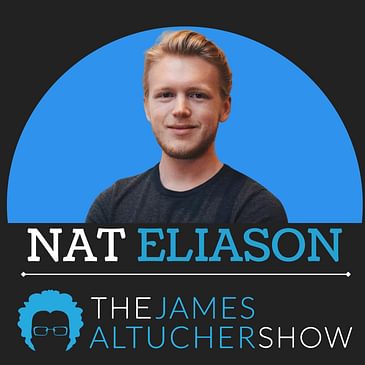A Note from James:
Today, we have an incredibly exciting guest, Nat Eliason, author of the riveting book Crypto Confidential: Winning and Losing Millions in the New Frontier of Finance. Tons of people have made millions, maybe even tens of millions, in the various crypto crazes of 2013, 2018, 2021, and now. In his book, Nat tells his own adventure of making a ton of money, losing a ton of money, making a ton of money again, and how it all ended up by creating his own tokens or currencies for a game and NFTs. You'll hear him talk all about it on the podcast. We'll discuss not only his story but also the future of crypto. Here it is; a great conversation.
Episode Description:
In this episode, James Altucher sits down with Nat Eliason, the author of Crypto Confidential. Nat shares his personal journey through the highs and lows of the crypto world, providing unique insights into the wild and often unpredictable world of cryptocurrency. From making and losing millions to creating his own tokens for games and NFTs, Nat's story is both cautionary and inspiring. They explore the evolving landscape of crypto, the impact of decentralized finance, and the future potential of blockchain technology. This episode is packed with real-life lessons and insider knowledge that you won't find anywhere else.
What You’ll Learn:
- The dynamics of making and losing millions in the crypto world.
- How to create and launch your own cryptocurrency tokens.
- The future of decentralized finance and blockchain technology.
- The psychological and financial challenges faced by crypto investors.
- Insights into the evolving trends and opportunities in the crypto market.
Chapters:
- 01:33 Nat Eliason's Crypto Journey Begins
- 02:07 The FOMO Effect and Early Crypto Experiences
- 03:21 The Rise of Bitcoin and Automated Investments
- 05:36 The World of Crypto Farming 08:13 The Evolution of Crypto Trends
- 09:42 Gaming and NFTs: A New Frontier
- 14:41 Tokenization and Real-World Applications
- 26:30 The Wild West of Crypto and Regulation
- 29:38 Learning Solidity and Building in Crypto
- 42:29 The Token Payment Dilemma
- 43:18 Unexpected Wealth from Token Launch
- 44:22 The NFT and Gaming Boom
- 47:28 Liquidity Issues and Market Realities
- 49:17 Public Wallet Scrutiny 55:21 Johnny's NFT Success Story
- 59:08 The Writing Journey
- 01:07:44 Future of Crypto and AI Coins
- 01:12:25 Potential of Crypto in Payments
- 01:16:39 Concluding Thoughts and Future Plans
Additional Resources:
- Nat Eliason's Book: Crypto Confidential
- OpenZeppelin: Ethereum Development Framework
- Coinbase: Cryptocurrency Exchange
- Uniswap: Decentralized Trading Protocol
- Blake Crouch's Dark Matter
------------
- What do YOU think of the show? Head to JamesAltucherShow.com/listeners and fill out a short survey that will help us better tailor the podcast to our audience!
- Are you interested in getting direct answers from James about your question on a podcast? Go to JamesAltucherShow.com/AskAltucher and send in your questions to be answered on the air!
------------
- Visit Notepd.com to read our idea lists & sign up to create your own!
- My new book, Skip the Line, is out! Make sure you get a copy wherever books are sold!
- Join the You Should Run for President 2.0 Facebook Group, where we discuss why you should run for President.
- I write about all my podcasts! Check out the full post and learn what I learned at jamesaltuchershow.com
------------
Thank you so much for listening! If you like this episode, please rate, review, and subscribe to “The James Altucher Show” wherever you get your podcasts:
Follow me on social media:





